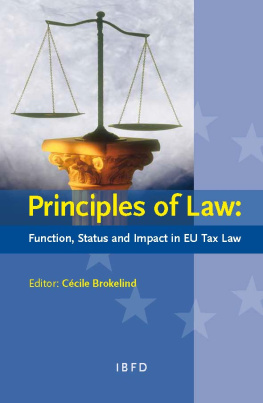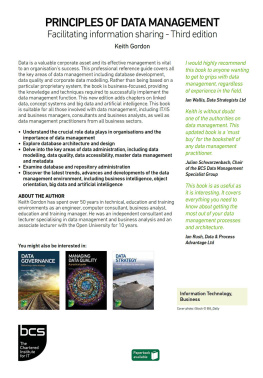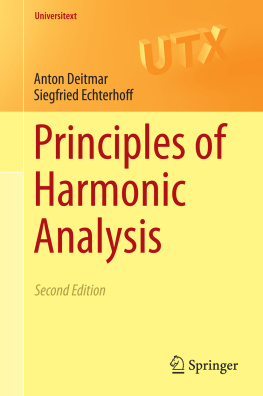Cécile Brokelind - Principles of Law: Function, Status and Impact in EU Tax Law
Here you can read online Cécile Brokelind - Principles of Law: Function, Status and Impact in EU Tax Law full text of the book (entire story) in english for free. Download pdf and epub, get meaning, cover and reviews about this ebook. year: 2014, publisher: IBFD, genre: Home and family. Description of the work, (preface) as well as reviews are available. Best literature library LitArk.com created for fans of good reading and offers a wide selection of genres:
Romance novel
Science fiction
Adventure
Detective
Science
History
Home and family
Prose
Art
Politics
Computer
Non-fiction
Religion
Business
Children
Humor
Choose a favorite category and find really read worthwhile books. Enjoy immersion in the world of imagination, feel the emotions of the characters or learn something new for yourself, make an fascinating discovery.
- Book:Principles of Law: Function, Status and Impact in EU Tax Law
- Author:
- Publisher:IBFD
- Genre:
- Year:2014
- Rating:5 / 5
- Favourites:Add to favourites
- Your mark:
- 100
- 1
- 2
- 3
- 4
- 5
Principles of Law: Function, Status and Impact in EU Tax Law: summary, description and annotation
We offer to read an annotation, description, summary or preface (depends on what the author of the book "Principles of Law: Function, Status and Impact in EU Tax Law" wrote himself). If you haven't found the necessary information about the book — write in the comments, we will try to find it.
Principles of Law: Function, Status and Impact in EU Tax Law — read online for free the complete book (whole text) full work
Below is the text of the book, divided by pages. System saving the place of the last page read, allows you to conveniently read the book "Principles of Law: Function, Status and Impact in EU Tax Law" online for free, without having to search again every time where you left off. Put a bookmark, and you can go to the page where you finished reading at any time.
Font size:
Interval:
Bookmark:
Principles of Law: Function, Status and Impact in EU Tax Law Editor:
IBFD Visitors address: Postal address: Telephone: 31-20-554 0100 2014 by the authors All rights reserved. No part of this publication may be reproduced, stored in a retrieval system or transmitted in any form or by any means, electronic, mechanical, photocopying, recording or otherwise, without the written prior permission of the publisher. Applications for permission to reproduce all or part of this publication should be directed to: permissions@ibfd.org. Disclaimer This publication has been carefully compiled by IBFD and/or its author, but no representation is made or warranty given (either express or implied) as to the completeness or accuracy of the information it contains. IBFD and/or the author are not liable for the information in this publication or any decision or consequence based on the use of it. IBFD and/or the author will not be liable for any direct or consequential damages arising from the use of the information contained in this publication. However, IBFD will be liable for damages that are the result of an intentional act ( opzet ) or gross negligence ( grove schuld ) on IBFDs part. In no event shall IBFDs total liability exceed the price of the ordered product. The information contained in this publication is not intended to be an advice on any particular matter. No subscriber or other reader should act on the basis of any matter contained in this publication without considering appropriate professional advice. Where photocopying of parts of this publication is permitted under article 16B of the 1912 Copyright Act jo. the Decree of 20 June 1974, Stb. 351, as amended by the Decree of 23 August 1985, Stb. 471, and article 17 of the 1912 Copyright Act, legally due fees must be paid to Stichting Reprorecht (P.O. Box 882, 1180 AW Amstelveen). Where the use of parts of this publication for the purpose of anthologies, readers and other compilations (article 16 of the 1912 Copyright Act) is concerned, one should address the publisher. ISBN 978-90-8722-259-8 (Print) My motto for this years GREIT conference was open the legal tools box, and find a way to satisfy my curiosity as well as to reward my efforts in looking around for those who would be interested in broadening their minds through an enriching cross-disciplinarily exercise. Happily, I have been able to find on my way lots of friends and colleagues who have accompanied and supported me in my quest. This book is the result of our collective journey. Moreover, the theme chosen for this conference, The Status, Function and Impact of Principles of Law in EU Tax Law , has provided me with an opportunity to pay tribute to Ronald Dworkin, who sadly passed away on 14 February 2013. Indeed, in my search for the right method to approach the research theme, I found Dworkins approach to the principles of law appealing, showing that in the legal tool box, both the legal theory ( philosophie du droit ) and the theory of law ( thorie du droit ) can be of help in carrying out the research task at hand. Legal theory not only tries to analyse the fundaments of the law, it also tends to find the normative value of the rule and assesses its coercive force. By contrast, the theorists of law try to adopt an interdisciplinary approach to study the effective practices of legal actors. At the crossroads of these disciplines, Dworkin investigated what the aim of the law is and what its foundations are, in order to explain whether and if so how, a specific rule is coercive or not. He found judicial decision-making should be supported with argumentation based on principles not policies, only the former being coercive as granting rights to individuals . Fundamental rights, procedural principles and administrative principles fall into this category. As explained in the coming chapters of this book, EU tax law is built upon these principles, which today, form the bones of our discipline. We are all concerned with the theories of adjudication and how far judges may go in the field of tax law. This book reflects our interrogations on some selected principles and tries to keep Dworkins words alive, discussing the role of the courts in the shaping of EU tax law. Most of us tend to agree that the European Court of Justice (ECJ) does not create the law when applying arguments of principle in hard cases, as Dworkin would have suggested. The extent to which political arguments interfere in this law-making is, however, controversial and merits some more space in academic literature. After 7 years of continuous inquiry, conferences in universities throughout Europe and the production of seven books, the GREIT network, founded in 2006 in Lund, returned to its country of birth in 2013, for the 8th GREIT conference (19 and 20 June 2013). This book is a follow-up of the previous years production and takes up the issues raised but unanswered during the meeting in Madrid (2012), Litigating EU Tax Law in International, National and Non-EU Tax Courts , when a number of underlying similar principles and general principles of EU law were noted to have been used by the judges to interpret the law. The remaining question was therefore to identify which principles form the back bone of EU tax law, and what their coercive force is, irrespective of their origins. I am very grateful to those of my peers who committed to help me in the organization of this mission. Firstly, I am indebted to Pasquale Pistone, Ana Paula Dourado and Dennis Weber for their trust and continued support with the GREITs activities, and I hope our common projects will continue to flourish as they have done so far. Its a worthwhile adventure that each individual can add to their own personal list of achievements. Additionally, I am also extremely thankful to all of the talented and honourable reporters who accepted the challenge of coming to Lund, to present their views and to contribute to this book in answer to my questions: Ana Paula Dourado, Joachim Englisch, Xavier Groussot, Daniel Gutmann, Marjaana Helminen, Sigrid Hemels, Oskar Henkow, Jrgen Hettne, Georg Kofler, Richard Lyal, Guglielmo Maisto, Marta Papis, Pasquale Pistone, Robert Phlsson, Madeleine Simonek, Edoardo Traversa, Takis Tridimas, Frans Vanistendael, Peter Wattel, Dennis Weber and Adam Zalasinski; thanks to you all!!! This project would never have been carried out without the precious financial support of the Swedish Research Council ( Vetenskapsrdet ), the Nordic Tax Research Council, IBFD and the Department of Business Law, School of Economics and Management, Lund University. I would also like to thank dearly Pamela Finckenberg-Broman, who carefully and enthusiastically directed the assistance of this project and helped me with all the practicalities that I would not have been able to carry out in connection with the hosting of our reporters and gathering together a team of dedicated helpers, to all of whom my gratitude is expressed. I am grateful too for Eleanor Campbells precious contribution in editing our reports. Finally, I should mention that when I was working at home on this project, I received the cheerful assistance of my dearest ones who kept the show running at home, without which this project would never have been carried out. To all of you and on behalf of the GREIT, my wholehearted thanks! Ccile Brokelind Lund, October 2013 Table of Contents |
Font size:
Interval:
Bookmark:
Similar books «Principles of Law: Function, Status and Impact in EU Tax Law»
Look at similar books to Principles of Law: Function, Status and Impact in EU Tax Law. We have selected literature similar in name and meaning in the hope of providing readers with more options to find new, interesting, not yet read works.
Discussion, reviews of the book Principles of Law: Function, Status and Impact in EU Tax Law and just readers' own opinions. Leave your comments, write what you think about the work, its meaning or the main characters. Specify what exactly you liked and what you didn't like, and why you think so.











